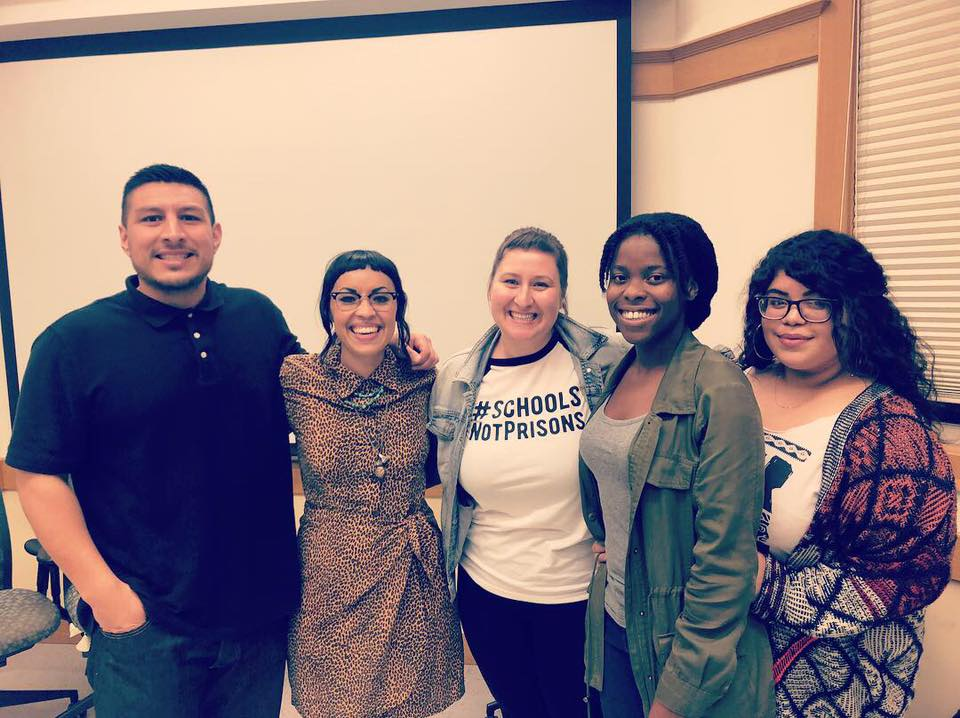
Beyond the Stats discusses Education As Freedom course
Beyond the Stats, an organization created nearly two years ago to provide support for formerly incarcerated students and those impacted by the prison system, held a Q&A style panel on Oct. 30 that featured several of the organization’s members.
Assistant Professor Ofelia Cuevas of the Chicanx Studies Department moderated the panel, and began by letting attendees know a bit about herself and why she feels such a strong connection with this organization. Her work focuses partly on race and prisons.
“I myself have studied the connection between race and prisons for 25 years,” Cuevas said. “I’m impacted by the system.”
Cuevas continued, providing important background information about the prison system to show why an organization like Beyond the Stats is needed, explaining that over the course of about two decades, starting in 1983, 28 prisons were built while only one UC was.
“These prisons never made an impact on public or private safety,” Cuevas said. “There are 1.6 million people in California with a criminal record. They all have someone, a relative or family that’s affected. I think we’re out there, everywhere.”
After Cueva’s introduction, the panelists first let the audience know about Beyond the Stats before taking turns to discuss how they found a home through the organization.
Tina Curiel-Allen, a co-founder of the organization, described Beyond the Stats as a “support system” which is important for formerly incarcerated students because their “trajectory is different than a third generation college student with wealth and privilege passed down to them. And that’s okay.”
Curiel-Allen said that she simply “wanted to know how other formerly incarcerated students were handling higher education.” She had the opportunity to ask that exact question in a sociology class which led her to other formerly incarcerated students in the class, including Daniel Mendoza, who would later co-found the organization alongside her.
Curiel-Allen no longer takes sociology classes, as she felt uncomfortable the way she became a subject and was studied as a statistic in those courses. Instead, she switched her major to Chicana/o Studies, where she feels that her peers are more willing to discuss incarceration and the prison system critically. Scharleth Guadamuz, a sociology and history double major and panelist, said she felt the same way about sociology and decided to balance the sociological issues with a historical perspective.
Another panelist was Briana Sue Zweifler, alumna of the UC Davis School of Law. Zweifler currently works as a legal fellow, focusing on the California Youth Justice Initiative at the National Center for Youth Law.
Mendoza, a sociology and ethnic studies double major and co-founder to the organization, was also a panelist. He and Curiel-Allen met two years ago in their sociology class and discovered they were dealing with similar experiences.
Mendoza recalled how he felt unsettled with what he saw reflected in other students in his first year at Davis. “When I first came here, everyone seemed to be just surviving.” Instead of falling into that same trap, Mendoza was determined to set a different standard.
“We [BTS] offer a sense of identity and community. Let’s go from surviving mode to thriving mode,” Mendoza said.
A popular topic among the panelists was the seminar taught under the Chicana/o Studies Department titled, “Education as Freedom: AKA Amerika This Is How You Made Me.” The syllabus was written by Curiel-Allen and another member not present at the panel, which consists of readings from Angela Davis, James Baldwin, Malcolm X and the Black Panther 10 point plan. Speaking to the course outline, Curiel Allen said that the department wanted to include scholars of color that have just as much to say as white scholars.
“These writers understand their position in relation to social power,” she said. “We are hoping students can do it too. We want to empower them and give them the language to tell their own stories like this.”
Unlike a typical class, this seminar has no lectures and is completely discussion-based and is meant to be a consciousness raising class. The class is set up in a circle, and before instruction begins, Mendoza said they ask students how they are — “just telling someone ‘I see you.’”
The goal of the seminar is to look at multiple systems and isn’t simply “to tell the saddest thing that’s happened to [us]. Our stories are part of a larger narrative,” Curiel-Allen said.
A long day on campus almost deterred third-year sociology and African/Afro-American Studies double major J’son Jones from attending the event, which he heard about from a friend from the Pan Afro Student Organization where Jones serves as historical counselor. But as he passed Hart Hall, he decided to stop by to support his friend.
The audience members had a chance to ask the panelists questions, prompting Jones to inquire about how to deal with the anger resulting from being discussed as a statistic and subject in sociology classes. Multiple panelists told him to speak up or else it will continue to happen. For Jones, their shared experiences and advice was exactly what he needed to hear.
“I was so mad, so I was wondering if you guys had a perspective on it and you did — so now the next time I’m in that class, I’m gonna say something,” Jones said.
Throughout the panel, Cuevas stated multiple times how proud she was of Beyond the Stats and what they’ve been able to accomplish.
“I’ve never worked with a group of students like this,” Cuevas said. “They came together on their own, they do their work on their own. A very true support system for each other.”
It definitely was a moment to remember for members of Beyond the Stats, as it was literally a dream come true.
“We created a wishlist when we were first starting and having a panel was on it,” Curiel-Allen said. “We’re very happy.”
Written by: Deana Medina — campus@theaggie.org



